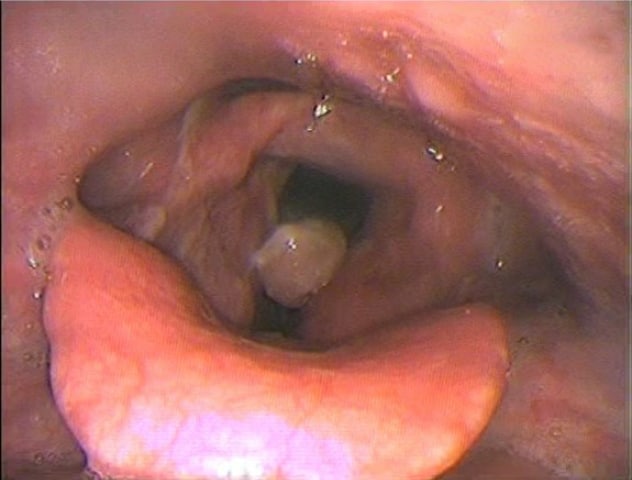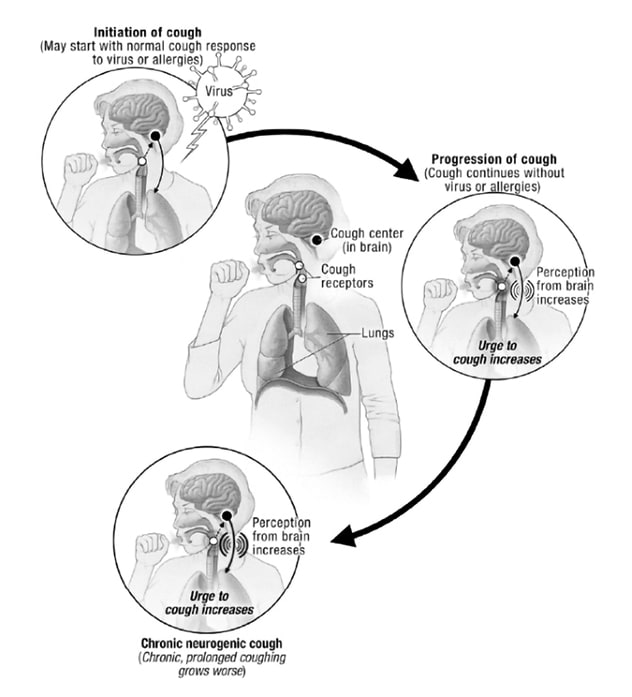April 03, 2021
Chronic cough, defined as a cough lasting over eight weeks, accounts for over 30 million annual health care visits in the U.S. Despite billions of dollars spent every year in health care visits, treatments and over-the-counter remedies, chronic cough continues to be a frustrating problem to treat for many patients. It is no surprise that chronic cough is one of the major reasons patients seek a pulmonary consultation.
In the majority of patients, the various common causes of chronic cough — including drug-induced cough, asthma, nonasthmatic eosinophilic bronchitis, upper airway cough syndrome (postnasal drip) and gastroesophageal reflux disease (GERD) — can usually be identified and treated through guideline-based evaluation and treatment. Routine initial testing occasionally reveals other conditions that were not considered previously, such as interstitial lung disease, bronchiectasis, tumors or chronic obstructive pulmonary disease.
"Published studies, including research published in The Lancet in 2008, show that anywhere between 10% and 50% of patients have unexplained or refractory chronic cough," says Sumedh S. Hoskote, M.B.B.S., Pulmonary and Critical Care Medicine, at Mayo Clinic in Rochester, Minnesota. "Our experience in the Mayo Clinic Cough Clinic shows that at least 50% to 75% of patients we see fall under the category of unexplained or refractory chronic cough."
Laryngeal structures seen on rhinolaryngoscopy

Laryngeal structures seen on rhinolaryngoscopy
Postoperative granulation tissue in the larynx was identified as the cause of this patient's chronic cough on rhinolaryngoscopy.
Specialists in Pulmonary and Critical Care Medicine have extensive experience with rhinolaryngoscopy, which is often performed as part of the initial consultation if deemed necessary. This is an office procedure that does not require fasting or sedation. "We gain a wealth of information from this procedure, which allows for inspection of the nasal passages for excessive mucus drainage, evaluation for nasal polyposis, nasal obstruction, cobblestone changes in the nasopharyngeal mucosa, pharyngeal crowding, evaluation of the larynx for features suggestive of GERD, assessment of vocal fold mobility that may be abnormal in vocal fold dysfunction, and evaluation of the larynx and subglottic region for masses," says Dr. Hoskote.
Mayo pulmonologists collaborate with Otolaryngology colleagues to revisit any concerning abnormalities that may be beyond the scope of pulmonary medicine to diagnose. Patients are sometimes noted to have significant posterior rhinorrhea that remains persistent even after treatment with nasal steroids or decongestants; Cough Clinic specialists have pioneered a triple combination nasal spray that uses antihistamine, anticholinergic and steroid medications. Mayo Clinic pharmacists dispense the spray as a compounded formulation.
Mayo's pulmonary function laboratories also have expertise in placement of 24-hour laryngopharyngeal reflux probes, which can further aid in the evaluation of GERD and other tests, such as an upper endoscopy or esophageal pH testing.
Cough hypersensitivity syndrome
A large proportion of patients who either do not have one of the common causes of chronic cough, or have had these causes addressed through treatment, may have a condition known as cough hypersensitivity syndrome. This condition is also referred to as neurogenic cough or laryngeal hyperresponsiveness. The condition remains a diagnosis of exclusion. Its characteristics include:
- Allotussia — a cough in response to mild irritants that do not normally cause cough
- Hypertussia — intense coughing induced by low-level tussigenic stimuli
- Laryngeal paresthesia — a persistent abnormal sensation in the throat
The cough cycle

The cough cycle
Illustration shows the process in which the urge to cough increases and leads to the cough-injury-cough cycle.
"We employ a multimodal approach to the management of cough hypersensitivity syndrome," says Dr. Hoskote. "The first step is a discussion of the cough-injury-cough cycle and the manner in which the urge to cough increases through prolonged neuropathic damage in the larynx. We then discuss various strategies of working on conscious behavior modification to reduce the urge to cough and to use techniques to break the cough cycle."
Refractory chronic cough
Pulmonary and Critical Care Medicine specialists also collaborate with Otolaryngology and Speech Pathology colleagues in the management of patients with refractory chronic cough. Speech and language therapy intervention for chronic cough has been shown to be beneficial in multiple clinical trials, as evidenced by a study published in Thorax in 2017. This form of therapy is also useful for patients who may have a component of vocal fold dysfunction in conjunction with neurogenic cough.
A number of pharmacotherapeutic options have been studied for unexplained chronic cough, including amitriptyline, nortriptyline, duloxetine, gabapentin and pregabalin. "These drugs deserve a careful discussion of risks and benefits," says Dr. Hoskote. "While strong trial data do not exist for any of these drugs, the current therapeutic arena is only now beginning to get populated. We often consider using a topical anesthetic such as a tetracaine lollipop, a formulation that was developed at Mayo Clinic that is compounded at Mayo Clinic pharmacies, as a useful adjunct to neurotropic medications."
Dr. Hoskote continues: "The future of unexplained chronic cough management holds a number of novel pharmacologic options that focus on various receptor targets in the cough reflex pathway. At Mayo Clinic, Pulmonary and Critical Care Medicine has been involved in a number of clinical trials that have helped develop some of these drugs, including gefapixant, serlopitant and orvepitant, and we will soon begin enrollment for an industry-sponsored trial to evaluate a novel P2X3 agent. Through a multidisciplinary approach and with ongoing clinical trials, we hope to continue providing our patients the best possible care for unexplained chronic cough."
For more information
Chung KF, et al. Prevalence, pathogenesis, and causes of chronic cough. The Lancet. 2008;371:1364.
Cough Clinic. Mayo Clinic.
Pulmonary function laboratories. Mayo Clinic.
Chamberlain Mitchell SA, et al. Physiotherapy, and speech and language therapy intervention for patients with refractory chronic cough: A multicentre randomised control trial. Thorax. 2017;72:129.
Pulmonary, Critical Care and Sleep Medicine Clinical Trials. Mayo Clinic.